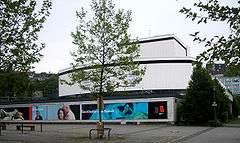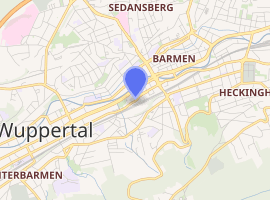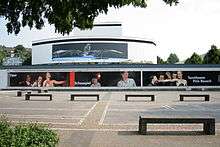Schauspielhaus Wuppertal
Schauspielhaus Wuppertal was a Schauspielhaus, a theatre for plays, in Wuppertal, North Rhine-Westphalia, Germany. The 745-seat municipal theatre is on Bundesallee next to the river Wupper in Elberfeld.[1] Designed by Gerhard Graubner, it was opened in 1966, run from 2001 by 'Wuppertaler Bühnen' (Wuppertal Stages, municipal theatres in Wuppertal).[2] Starting in 2009, the house operated only 135 seats, and it was closed on 30 June 2013.[3]
| Schauspielhaus Wuppertal | |
|---|---|
 The theatre in 2005 | |

| |
| General information | |
| Status | closed |
| Type | Theatre |
| Location | Wuppertal, North Rhine-Westphalia, Germany |
| Address | Bundesallee |
| Coordinates | 51°16′02″N 7°11′37″E |
| Construction started | 1964 |
| Opened | 1966 |
| Design and construction | |
| Architect | Gerhard Graubner |
| Other information | |
| Seating capacity | 745 / 135 |
| Website | |
| wuppertaler-buehnen | |
History
All theatres in Wuppertal were damaged in World War II. Performances were held in various locations. After the opera house was restored in 1956, the town decided in 1962 to build a new house dedicated to plays. In 1963 Gerhard Graubner was commissioned to build a house with 750 seats. Construction started in 1964.
The Schauspielhaus was opened on 24 and 25 September 1966, playing Gotthold Ephraim Lessing's Nathan der Weise and Else Lasker-Schüler's Die Wupper (de).[1] Heinrich Böll delivered a speech for the inauguration in the presence of president Heinrich Lübke, "Die Freiheit der Kunst" (Freedom in the art).[4]
Since June 2000, the building has been protected as an architectural monument.[5] During construction at the opera house from 2006 to 2009, it showed also opera and productions of the 'Tanztheater Wuppertal' (Dance Theatre Wuppertal) created by Pina Bausch.[6] In 2009 the house needed major repair, forcing it to be closed.[7] As a renovation could not be funded, a 135-seat studio theatre, the 'Kleines Schauspielhaus' operated in the foyer from the 2009/2010 season.[4][8] The premiere was on 25 September 2009 Eine Billion Dollar.[1] Protests by citizens[9] achieved a delay for the complete closing until 2013.[4] The last performance was on 30 June 2013. Cleanup has to be finished by 31 July 2013.[2] A further use as an international archive for the dance theatre or en extension of the Von der Heydt Museum is considered, but depends on major renovation that likely also can not be funded.[3]
Architecture

The house is structured in three elements, following its functions. The building is symmetrical in layers of different height. White walls are accented by a "Fensterband", a horizontal arrangement of narrow windows.
The broad entrance hall is on the ground floor, also the foyer including two atriums with Japanese gardens. The great hall is above and beyond it, its outer walls are slightly curved. The seats are arranged in 20 rows in the style of an amphitheatre. The stage house is a high cube, situated next to the river.
Literature
- Informationen Schauspielhaus der Stadt Wuppertal erbaut 1964–1966, Hochbauamt of Wuppertal
References
- "Wuppertaler Bühnen" (in German). nrw-buehnen.de. Retrieved 30 June 2013.
- Thöne, Martina (20 July 2013). "Ein letzter Blick ins Schauspielhaus" (in German). Westdeutsche Zeitung. Retrieved 21 July 2013.
- Thöne, Martina (21 June 2013). "Wuppertaler Schauspielhaus: Endstation Leerstand" (in German). Westdeutsche Zeitung. Retrieved 30 June 2013.
- Opitz, Barbara (11 November 2012). "Theaterschliessung in Wuppertal / Kampf der Kulturen" (in German). taz. Retrieved 29 June 2013.
- "Schauspielhaus" (in German). Wuppertal (List of monuments). Retrieved 1 July 2013.
- "Kleine Spielstätte im Schauspielhaus" (in German). Wuppertal. Retrieved 29 June 2013.
- "Schrumpfkur soll Neuanfang in Wuppertal bringen" (in German). Focus. Retrieved 29 June 2013.
- Cieminski, Karin von (18 November 2011). "Wuppertaler Schauspielhaus von Schließung bedroht" (in German). Ruhr-Nachrichten. Retrieved 29 June 2013.
- "24-Stunden-Kulturkampf in Wuppertal" (in German). Kölner Stadt-Anzeiger. 30 January 2010. Retrieved 29 June 2013.
External links
- Wuppertaler Bühnen Website (in German)
- Tanztheater Wuppertal (in German)
| Wikimedia Commons has media related to Schauspielhaus Wuppertal. |